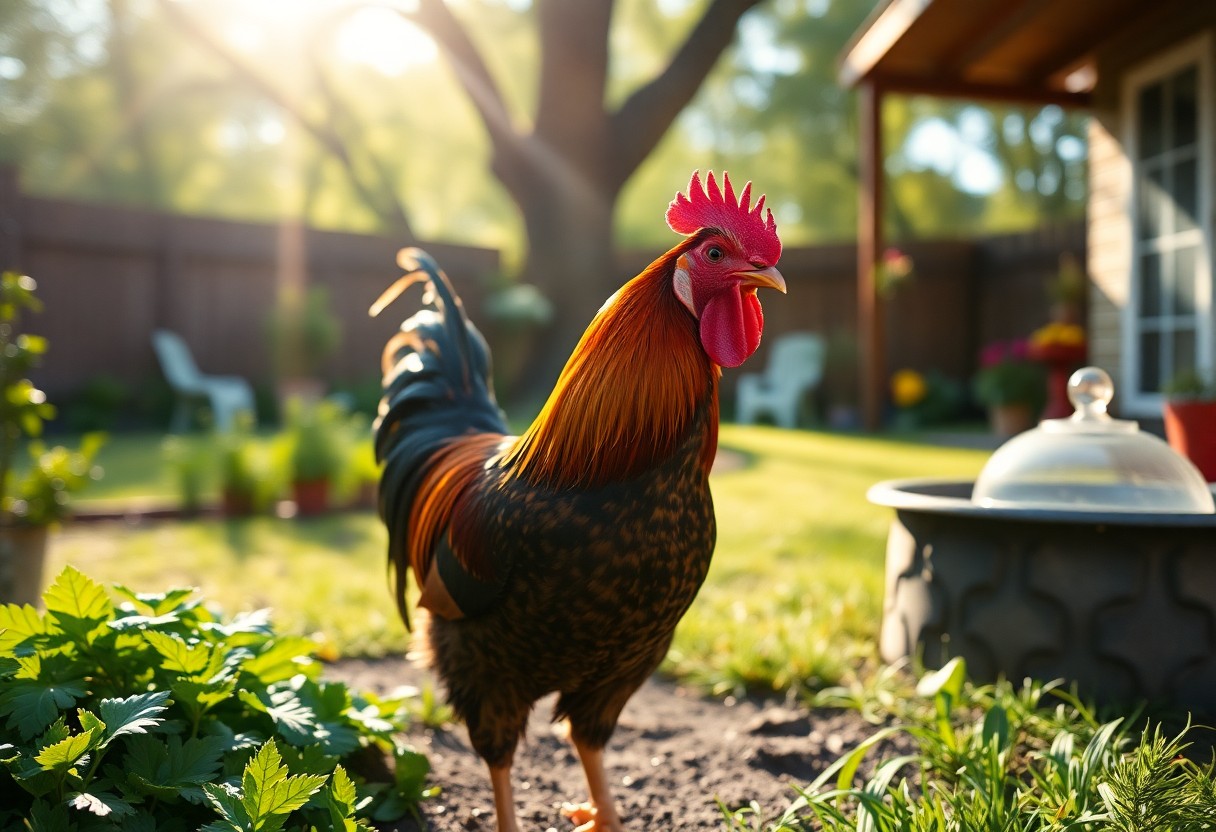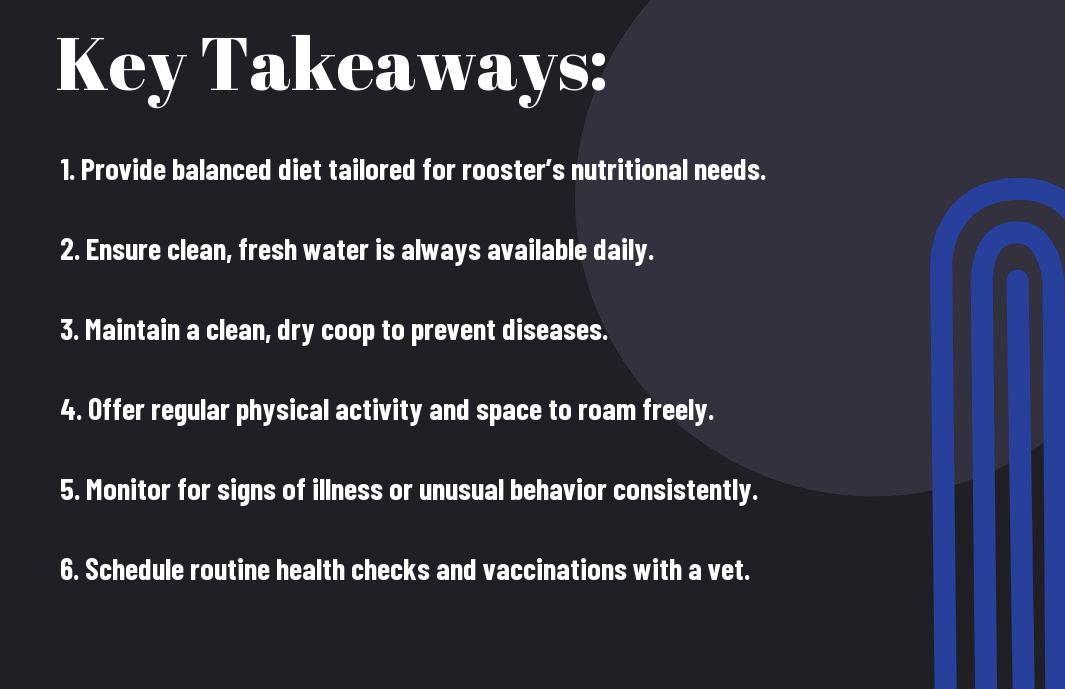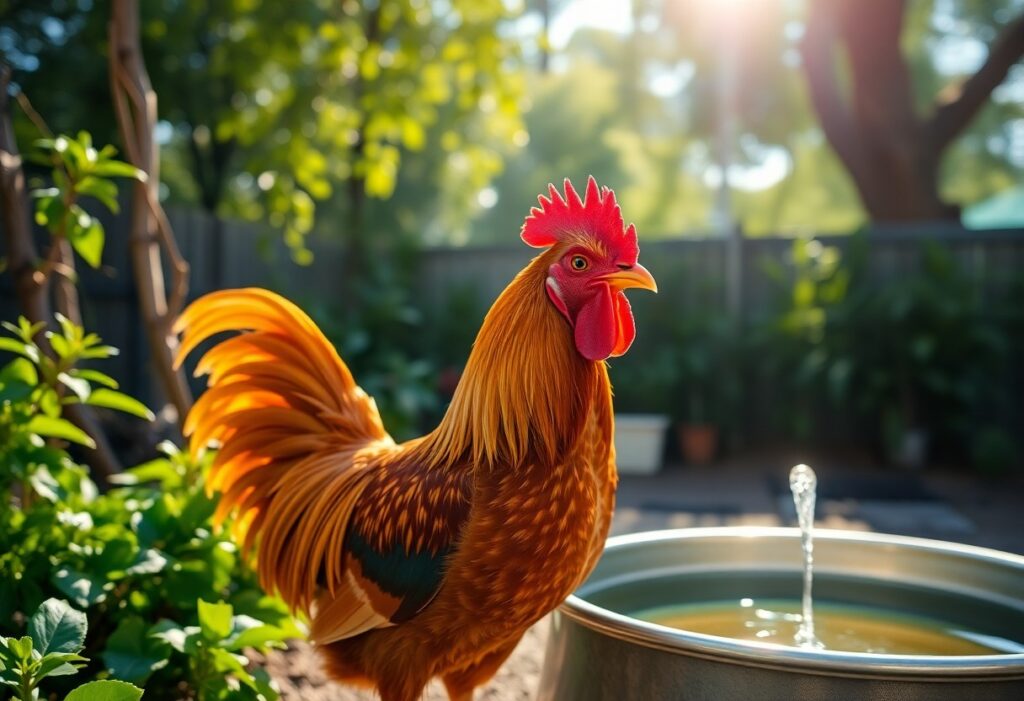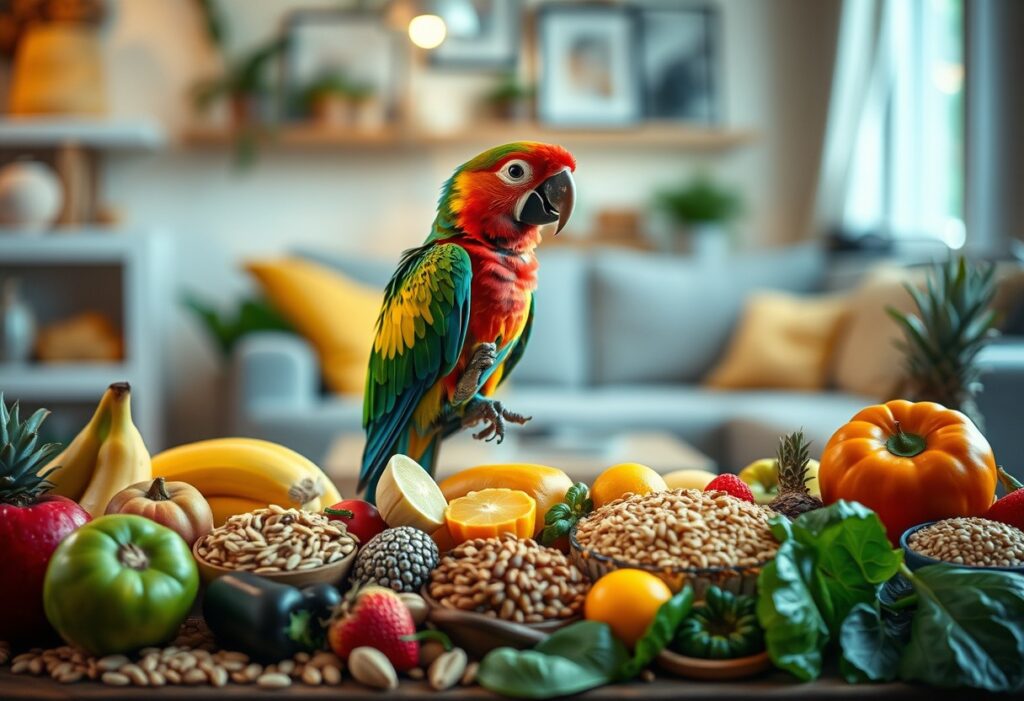Rooster health is vital for a thriving flock, and as a responsible owner, you want to ensure your bird is in the best condition possible. Incorporating proper nutrition, clean living environments, and regular health checks will go a long way in keeping your rooster healthy and happy. This list will guide you through crucial practices to enhance your rooster’s well-being, ensuring he remains vibrant and productive in your backyard. Let’s explore the top ten tips to foster optimal health in your feathered friend!

Key Takeaways:
- Provide a balanced diet rich in nutrients to ensure healthy growth and development.
- Maintain a clean and spacious living environment to prevent diseases and promote well-being.
- Regularly monitor your rooster’s behavior and physical condition for early signs of health issues.

Provide Fresh Water
For your rooster to thrive, you must provide a constant supply of fresh water. Water is necessary for digestion, temperature regulation, and overall health. Make sure to have accessible water sources at all times, as even a brief lack of hydration can lead to stress and health complications.
Change Daily
Water should be changed daily to ensure it stays clean and free from contaminants. Stagnant water can become a breeding ground for bacteria and algae, which can harm your rooster’s health over time. A routine check each day can help promote a healthier living environment.
Keep Clean
Fresh water is vital, but keeping the water container clean is just as important. Provide your rooster with a clean water source by regularly washing the container with soap and rinsing it thoroughly. Residual dirt and grime can introduce harmful bacteria into the water, putting your bird at risk for illness. Schedule weekly deep cleanings, and inspect regularly for any signs of build-up. A little effort in maintaining cleanliness can lead to a significantly healthier and happier rooster.
Balanced Diet
It is crucial to provide your rooster with a balanced diet to promote optimal health and well-being. A healthy diet ensures that your rooster receives the necessary nutrients for strong feathering, robust immunity, and overall vitality. Focus on a mix of grains, seeds, and protein sources to support growth and activity levels. Ensuring variety in their diet will not only keep your rooster healthy but also happy and engaged.
Quality Feed
Even the best farming practices can fall short without the right feed. Invest in high-quality commercial feed specifically formulated for roosters, which contains optimal levels of protein, vitamins, and minerals. This helps to ensure that your rooster gets the necessary nutrients for strength and productivity. Avoid low-quality feeds that may contain fillers or additives that can be unhealthy for your bird.
Supplement Greens
Supplementing your rooster’s diet with fresh greens is vital for their nutrition and health. Your roosters will benefit from a variety of leafy vegetables, such as kale, spinach, and lettuce, which provide crucial vitamins and minerals. These greens not only enhance their diet but also help to ensure proper digestion and improve overall health. Additionally, greens can serve as an excellent source of hydration, particularly in warmer months.
This addition of greens can significantly impact your rooster’s health and behavior. Not only are greens rich in nutrients, but they also offer a natural way to enrich your rooster’s diet, combat potential nutritional deficiencies, and promote better digestion. Greens serve as a natural source of hydration, vital in warm weather, keeping your rooster cool and comfortable. Be cautious, however, as some greens can be harmful in large amounts, so always research which vegetables are safe. Regularly providing a variety of greens will undoubtedly enhance your rooster’s well-being and vitality.
Regular Exercise
Keep your rooster active by incorporating regular exercise into their daily routine. Engage them in activities that mimic their natural behaviors, such as foraging, scratching, and running. This not only promotes physical health but also stimulates their mental well-being. By keeping your rooster physically fit, you increase their vitality and enhance their overall quality of life.
Outdoor Access
The best way to ensure your rooster gets enough exercise is to provide outdoor access. Giving them space to roam allows for natural behavior, such as pecking and exploring, which keeps them engaged and reduces boredom.
Safe Environment
Assuming your rooster has outdoor access, ensure that the environment is safe from potential dangers like predators and harsh weather. Providing a secure area will allow your rooster to explore freely while minimizing stress and injury.
Regular inspections of your outdoor space are necessary to maintain a safe environment. Check for any signs of hazardous obstacles, such as sharp objects or toxic plants, that could pose a risk to your rooster. Make sure they are protected from predators like hawks or raccoons, and consider installing fencing that is high enough to deter them. Provide shelter against extreme weather conditions to ensure your rooster stays comfortable and healthy. By taking these precautions, you can create a secure environment that promotes your rooster’s well-being.
Clean Living Space
Once again, providing a clean living space for your rooster is necessary for their health and well-being. Regular cleaning helps to minimize the risk of disease, pests, and odors, ensuring a healthy environment for your bird. A clean coop not only promotes a comfortable setting for your rooster but also encourages good habits, leading to a happier and more productive life.
Frequent Cleaning
You should aim to clean your rooster’s living space frequently to keep it sanitary. This includes removing droppings, uneaten food, and bedding regularly. A consistent cleaning schedule will prevent the buildup of harmful bacteria and parasites, creating a healthier environment for your rooster to thrive.
Proper Ventilation
Clean air circulation is vital for your rooster’s comfort and health. Make sure your coop has adequate ventilation to allow fresh air in and exhaust stale air out. A well-ventilated space helps to reduce moisture and ammonia levels, which can lead to respiratory issues in your rooster.
For instance, by ensuring that there are adequate openings or windows in the coop, you can maintain a flow of fresh air throughout the space. This will not only help in keeping your rooster’s environment less humid but also minimize harmful odors often associated with droppings. Be cautious, however, of drafts during colder months, as extreme temperature fluctuations can be detrimental to your rooster’s health.
Monitor Health
Your rooster’s health requires constant monitoring to ensure optimal well-being. Regularly observe your bird for any changes in behavior, appetite, and physical condition. Swift identification of potential health issues can make all the difference in managing diseases or injuries effectively. Make it a habit to conduct routine checks, as this will help you maintain a healthy environment for your rooster.
Observe Behavior
If you notice any shifts in your rooster’s behavior, such as lethargy, increased aggression, or unusual vocalizations, these could be indicators of underlying health issues. Pay attention to how your rooster interacts with the flock and its surroundings, as social behavior is a good indicator of overall well-being.
Check for Signs
The signs of health problems in your rooster can manifest in various forms. Look for changes in appetite, weight loss, feather condition, and droppings. Swollen eyes, limping, or isolation from the flock can signal an illness or injury that needs immediate attention. Also, be alert for unusual behaviors like feather plucking or excessive dust bathing, as these may indicate stress or skin issues.
Check your rooster regularly for visible signs of discomfort or distress. Observe the droppings, noting any changes in color, consistency, or frequency, as these can often reveal health problems. Inspect the feathers and skin for any signs of parasites such as mites or lice. Additionally, monitor for respiratory signs like wheezing or nasal discharge, as these could be symptoms of infection. By staying vigilant, you can quickly address any potential health hazards before they escalate.
Prevent Parasites
Not taking the time to address parasite issues can seriously affect your rooster’s health. Common parasites such as mites, lice, and worms can cause a host of problems, including weight loss, skin irritations, and decreased egg production. Creating a routine for parasite management is imperative for ensuring your rooster’s well-being. Regular inspections, proper sanitation, and preventive measures will go a long way in keeping your flock healthy.
Regular Deworming
For optimal health, it’s important to incorporate a regular deworming schedule into your rooster’s care routine. Depending on your environment and local parasite prevalence, you may need to deworm your rooster every 3 to 6 months. Consult with your veterinarian to determine the most effective deworming products for your flock and follow dosage guidelines closely to ensure the best results.
Pest Control
An effective pest control strategy is vital for safeguarding your rooster from harmful parasites. Regularly cleaning and disinfecting the coop, combined with diligent observation of your flock, can help you identify and address any pest infestations early on. Additionally, utilizing natural deterrents and maintaining a clean yard can minimize the risk of external pests.
It is imperative to monitor your coop for signs of pest infestations such as feathers on the ground, decreased activity, or increased scratching. Establishing a consistent cleaning routine will not only reduce the presence of harmful parasites but also promote a more comfortable living environment for your rooster. Using natural pest deterrents like garlic or diatomaceous earth can provide additional protection against these unwanted visitors. By prioritizing pest control, you enhance your rooster’s overall health and productivity.
Routine Health Checks
Despite the common misconception that health checks are only necessary for household pets, regularly monitoring your rooster’s health is vital. Maintaining a routine health check can help you catch any potential issues early on, ensuring that your rooster remains healthy and vibrant. Pay attention to their physical appearance, behavior, and any changes in their eating habits, as these can be early indicators of underlying health problems.
Vet Visits
Even though it may seem like an extra expense, scheduling regular vet visits is necessary for your rooster’s health. A veterinarian can conduct comprehensive examinations and provide expert advice on diet, living conditions, and any specific health concerns you may have. Consider establishing a good relationship with a local vet experienced in avian care to ensure your rooster receives optimal support.
Vaccinations Necessary
One of the most proactive steps you can take to protect your rooster’s health is ensuring they receive the necessary vaccinations. Regular vaccinations can prevent common diseases that can severely impact your rooster’s health and wellbeing.
Any rooster owner should be aware that certain diseases, such as Newcastle disease and infectious bronchitis, pose serious threats to your bird’s health. Vaccinations can effectively prevent these diseases, allowing your rooster to thrive in a safe environment. Consult your vet for a vaccination schedule tailored to your rooster’s age, region, and health needs, ensuring they receive all necessary shots to stay healthy and productive.
Social Interaction
After ensuring your rooster has a balanced diet and proper living conditions, focusing on social interaction is key to their overall well-being. Roosters are inherently social animals and thrive in a stimulative environment. Providing opportunities for interaction with other birds helps to develop their social skills, reduces loneliness, and promotes a healthier, more active lifestyle.
Promote Flock Mentality
An effective way to enhance your rooster’s well-being is to promote a flock mentality. When your rooster is part of a cohesive group, it encourages natural behaviors such as foraging, preening, and socializing. This bond not only keeps your rooster engaged but also helps in alleviating feelings of stress and anxiety.
Reduce Stress
Flock dynamics play a significant role in managing stress levels in your rooster. Creating a calm environment helps to ease tensions within the group, ensuring that your rooster feels secure and safe. High-stress situations can lead to health issues, reduced egg production, and aggressive behavior. It’s important to minimize disruptions and maintain harmony within your flock.
To effectively reduce stress, pay attention to your rooster’s environment and interactions. Ensure they have enough space to avoid crowded conditions, and provide various hiding spots and enrichment activities to keep them occupied. Keeping a consistent routine can also minimize anxiety, as your rooster will learn what to expect daily. By focusing on creating a peaceful atmosphere, you’re fostering a healthier and more content rooster.
Provide Shelter
Unlike many pets, roosters require a dedicated shelter to thrive and maintain their health. This shelter should be well-ventilated, secure, and spacious enough to accommodate movement and comfort. Providing a safe haven protects your rooster from predators and harsh weather, ensuring they feel secure and at ease. An ideal shelter is also easy to clean, aiding in the prevention of disease and promoting overall wellness.
Protect from Elements
While it may be tempting to let your rooster roam freely, providing protection from the elements is vital for their well-being. Exposure to extreme temperatures, whether hot or cold, can lead to stress and health issues. By ensuring your shelter is insulated and shaded, you create a safe environment that allows your rooster to thrive regardless of the weather.
Safe Nesting Areas
Shelter for your rooster includes creating safe nesting areas where they can rest and lay eggs. Ensure that these nesting spots are snug, sheltered from drafts, and elevated to deter pests. This security will encourage your rooster to utilize the space, ultimately leading to healthier reproductive habits. By providing clean and cozy nesting areas, you promote a positive routine and support your rooster’s overall well-being.
With a focus on creating a comfortable environment, think about the materials used for nesting. Utilize clean straw or wood shavings to line the area, making it inviting and hygienic. Regularly check and replace bedding to prevent moisture buildup and discourage parasites. You can enhance your rooster’s comfort further by offering a few hidden spaces within the nesting area for privacy, allowing your bird to feel safe and undisturbed while they lay eggs.
Handle with Care
Now, handling your rooster with care is crucial for building trust and promoting a healthy environment. Approach your bird calmly and confidently to ensure it feels safe. Handling your rooster properly can also prevent injuries and reduce the risk of aggressive behavior.
Gentle Handling
You’ll find that gentle handling fosters a strong bond between you and your rooster. Always support its body properly when picking it up, allowing it to feel secure. This will help alleviate any fears and make the experience more enjoyable for both of you.
Minimize Stress
You’ll need to take steps to minimize stress for your rooster, as stress can have serious negative effects on its health. Ensuring a peaceful environment, maintaining consistent routines, and reducing loud noises will significantly contribute to your bird’s well-being.
Plus, understanding the signs of distress in your rooster will help you take proactive measures. Common signs include pacing, excessive crowing, or feather plucking. Providing a safe, comfortable space with adequate shelter and proper socialization can help alleviate stress. Regularly checking for any changes in behavior or health will ensure your rooster remains content and thrive.
Final Words
From above, it’s clear that maintaining optimal health in your rooster requires a holistic approach. By focusing on proper nutrition, regular veterinary check-ups, appropriate housing, and consistent social interaction, you can enhance your rooster’s well-being. Ensuring a clean environment, monitoring behavior, and providing adequate exercise will further support their health. By implementing these vital tips, you give your rooster the best chance to thrive, ensuring a vibrant and productive addition to your flock.
FAQ
Q: What is the best diet for maintaining the health of my rooster?
A: A balanced diet is key to ensuring your rooster stays healthy. Incorporate high-quality feed that is specifically formulated for poultry, which includes necessary nutrients such as proteins, vitamins, and minerals. Supplementing their diet with fresh vegetables, grains, and occasional protein sources like insects can promote overall health. Make sure they always have access to clean, fresh water to keep them hydrated.
Q: How important is the living environment for my rooster’s health?
A: The living environment plays a significant role in your rooster’s well-being. Ensure that the coop is clean, dry, and well-ventilated to minimize stress and prevent disease. Provide enough space for your rooster to move freely, as overcrowding can lead to aggression and health issues. Regular cleaning, proper bedding, and protection from predators will create a safe and healthy environment for your rooster.
Q: What routine health checks should I perform on my rooster?
A: Regular health checks are vital to catch any issues early. Examine your rooster for signs of good condition, such as bright eyes, clean feathers, and active behavior. Check for any signs of illness, such as lethargy, unusual droppings, or respiratory issues. Schedule vaccinations and deworming as needed, and consult a veterinarian for routine health assessments to ensure your rooster remains in optimal health.










